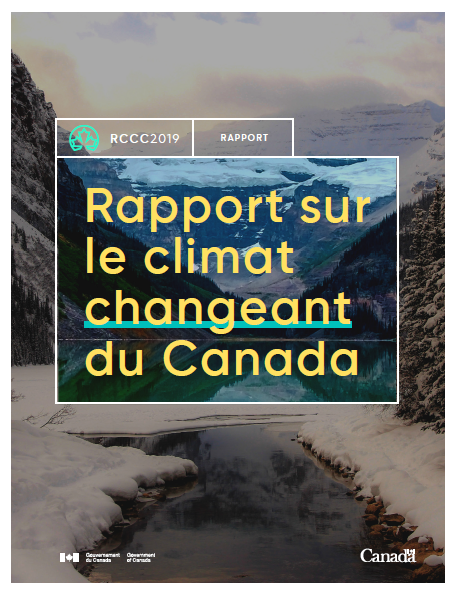Conférences itinérants
LE CONFÉRENCIER ITINÉRANT SCMO - 2020 (voir l'horaire )
 |
Sujet de la présentation: Titre: Principales conclusions du Rapport sur le climat changeant du Canada Résumé : La tournée de cette année est un peu particulière : sept conférenciers et un seul sujet. Les conférenciers Barrie Bonsal, Elizabeth Bush, Chris Derksen, Greg Flato, Nathan Gillet, Blair Greenan et Lawrence Mudryk parleront du Rapport sur le climat changeant du Canada |
Conférenciers itinérants passés
| Anneé | Nom | Titre |
| 2019 | Roberta Hamme Laxmi Sushama |
Les concentrations en oxygène des océans contrôlent les endroits où les organismes s’y développent, Dialogue climat-ingénierie dans le contexte des systèmes d'ingénierie arctiques |
| 2018 | Gilbert Brunet | Vers des prévisions intégrées du temps et du climat -
https://collaboration.cmc.ec.gc.ca/science/rpn/pers/pages/brunet_gilbert/en/ |
| 2017 | Richard Dewey | Anomalies récentes dans le Pacifique : les oscillations, El Niño et le fameux « Blob » |
2016 |
Francis Zwiers Prof. Ronald Stewart |
Conditions climatiques extrêmes - sont-elles réelles, ou tout simplement imaginées? Précipitations dangereuses à des températures près de 0 °C |
| 2015 2015 |
Kumiko Azetsu-Scott Dr. Charles Hannah |
Environ 1/4 du dioxyde de carbone (CO2) libéré dans l'atmosphère par les activités humaines depuis le début de la révolution industrielle dans les années 1800, a été absorbé par les océans. Un aperçu de la |
| 2014 | Tom McElroy | Ozone Science: From Discovery to Recovery - and Beyond |
| 2013 | Denis Gilbert | Oceans and Climate Change / Océans et |
| 2012 | Eyad Atallah | Where's the rain? A talk on the connection between tropical cyclones in the North Pacific and drought in Western Canada |
| 2011 | Thomas F. Pedersen | Climate Change and the Pacific Institute for Climate Solutions: Blending Science, Social Science, Politics and Opportunity |
| 2010 | Jim Drummond | Our PEARL Near the Pole: Atmospheric Research at 80oN |
| 2009 | Ken Denman | Climate Change: a Collision of Science, Politics, Economics and Ethics / Le |
| 2007-2008 | Ed Hudson | Arctic Weather / Le Temps a |
| 2006-2007 | Fraser J.M. Davidson & Dan Wright * | Ocean Forecasts for Canadians: Improving safety at sea through prediction of ocean behaviour |
| 2005-2006 | Phil Chadwick | |
| 2005 | Maurice Levasseur | Testing the Iron-DMS-Climate Connection in the Subarctic Pacific / Tester la relation f er-DMS- c |
| 2004 | M.A. Jenkins | Coupled Wildfire-atmosphere Modelling / Modélisation couplée f |
| 2003 | Geoff L. Holland | The Challenges, Past, Present and Future of Ocean Observing Systems |
| 2002 | Michel Jean | Non-traditional Applications of Meteorological Modelling |
| 2001 | Howard J. Freeland | Argo Armada - a Global Array of Profiling Floats |
| 2000 | Robert S. Schemenauer | Fog and Fog Collection - Exploring this Hidden Water Resource |
| 1999 | Greg Flato | The Cryosphere and Climate Change |
| 1998 | Natalie Gauthier | The |
| 1996-1997 | William Hsieh | Neural Networks for Short-Term Climate Prediction |
| 1995-1996 | Ambury Stuart | How to Establish a Small Scientific Consulting Business |
| 1994-1995 | J.R.N. Lazier | The North Atlantic Oscillation versus the Cold Fresh Fishless Labrador Sea |
| 1993 | A. Staniforth | Numerical Forecasting of the Atmosphere |
| 1992 | Jim Gower | Satellite Images - Where are we after 20 years? |
| 1991 | J.-P. Blanchet | Global Climate Modelling |
| 1990 | M.I. El-Sabh * | The International Decade for Natural Hazard Reduction - A Challenge for Canadian Meteorologists and Oceanographers |
| 1989 | David Phillips Peter Zwack * |
Canadian Weather Legends - Facts, Fallacies and Fables |
| 1988 | Trevor Platt | The Role of Marine Plant Life |
| 1987 | M. Khandekar - W. Canada L.A. Mysak - E. Canada |
Asian Monsoon Droughts and Floods Ocean Wave Modelling |
| 1986 | D. Farmer | Uses of Acoustic Techniques in Meteorology and Oceanography |
| 1985 | R. Portelli, B. Weisman | |
| 1984 | Warren L. Godson * | Diagnosis and Prognosis of Atmospheric Science Controversies |
| 1983 | R.O. Ramseier * | Passive Microwave Remote Sensing of Sea Ice |
| 1982 | P.A. Taylor | Wind Power in Canada - Some Meteorological Aspects |
| 1981 | G.L. Austin, W.J. Emery | |
| 1980 | M. Glanz | |
| 1979 | A. Fraser | |
| 1978 | D.S. Davison | |
| 1976 | J. Maybank * | |
| 1975 | P.E. Merilees * | |
| 1974 | A.G. Davenport | |
| 1973 | W.R. Frisken | |
| 1972 | M.B. D |
|
| 1971 | F.K. Hare * | |
| 1970 | T.R. Oke | |
| 1969 | K.M. King |
* = Décédé
Note: For many years these Tour Speakers were supported by AES and DFO.
